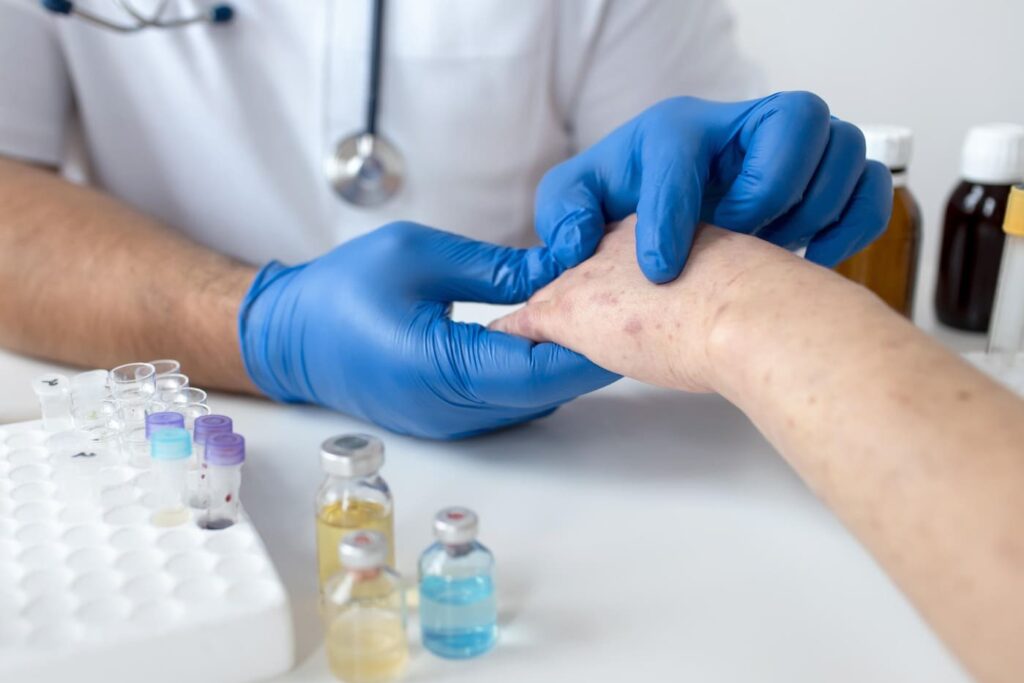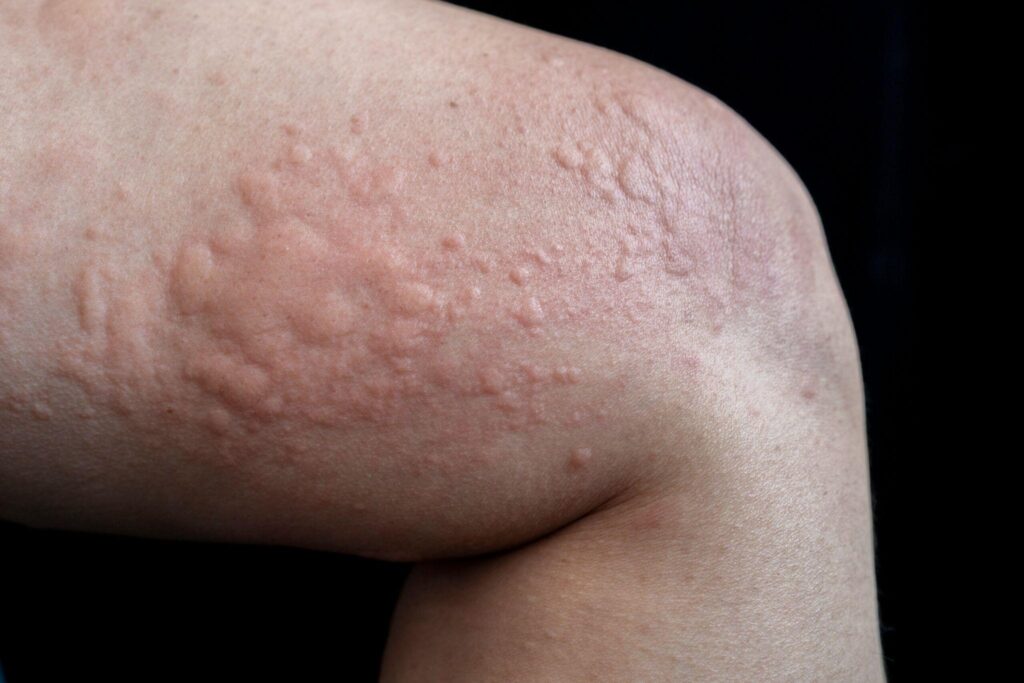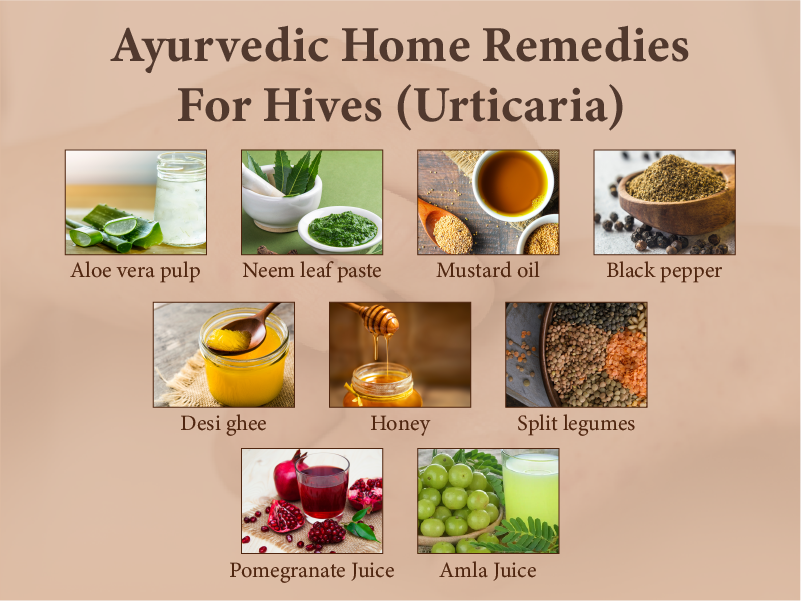Last updated on April 18th, 2025 at 05:22 pm

Urticaria treatment involves the use of medications, primarily antihistamines, to alleviate symptoms like itching and hives. Urticaria, commonly known as hives, can be a maddening condition characterized by itchy, raised welts on the skin. Finding the right urticaria (hives) treatment is crucial for anyone dealing with this annoying and often uncomfortable skin ailment.
Whether you’re struggling with chronic urticaria or experiencing occasional flare-ups, various approaches for urticaria treatment can help alleviate symptoms and provide much-needed relief.
Urticaria Treatment
Urticaria, or hives, manifests as red, itchy welts on the skin’s surface. These welts can vary in size and shape and often appear suddenly, causing discomfort and frustration. The root cause of urticaria is an immune response that triggers the release of histamines, leading to the characteristic skin rash.
Common triggers for urticaria include certain foods, medications, insect stings, pollen, stress, and physical stimuli like heat, cold, or pressure. In some cases, the exact cause remains unknown, which is referred to as chronic idiopathic urticaria. However, effective urticaria treatment can help manage symptoms regardless of the cause.
Best Hives Treatment
The best remedies for Urticaria treatment (hives) treatment are as follows:
1. Over-the-counter (OTC) Medications
For mild cases of urticaria, OTC antihistamines like cetirizine (Zyrtec) or loratadine (Claritin) can provide relief from itching and reduce the severity of hives. These medications work by blocking the effects of histamine and are generally safe for short-term use. However, it’s essential to follow the dosing instructions and consult with a healthcare provider if symptoms persist.
> Consult a Doctor and Medkart will help you Order Medicines Online
2. Prescription Medications
In more severe cases or chronic urticaria, prescription medications may be necessary. These may include:
- Prescription-strength antihistamines: When OTC antihistamines don’t provide sufficient relief, a healthcare provider may prescribe stronger versions.
- Corticosteroids: In cases of acute urticaria, a short course of oral or topical corticosteroids may be prescribed to reduce inflammation and itching.
- Immunosuppressants: For chronic urticaria that doesn’t respond to other treatments, immunosuppressant medications like cyclosporine may be considered. These drugs help suppress the immune response that leads to hives.
- Biologics: Recently, biologic drugs like omalizumab (Xolair) have shown promise in treating chronic idiopathic urticaria by targeting specific immune system pathways involved in the condition.
Alternate Remedies of Urticaria
In addition to medications, some individuals find relief through alternative therapies, such as:
- Light Therapy: Phototherapy, or light therapy, exposes the skin to controlled amounts of ultraviolet (UV) light to reduce inflammation and itching.
- Herbal Remedies: Certain herbs, such as nettle leaf, have been used traditionally to alleviate hives. However, the efficacy of herbal remedies varies, and it’s essential to consult with a healthcare provider before trying them.
- Acupuncture: Some individuals report relief from urticaria symptoms after acupuncture sessions, although scientific evidence supporting its effectiveness is limited.

Urticaria Cream Treatment
Urticaria cream treatment involves the application of topical creams or ointments specifically formulated to relieve the itching and inflammation associated with hives. These creams often contain antihistamines or corticosteroids, which work to block histamine responses and reduce skin irritation.
Urticaria cream treatment is effective for localized hives, providing fast relief directly to the affected area. It is a convenient and non-invasive option for managing the discomfort of urticaria, particularly in cases of mild to moderate outbreaks. However, for chronic or severe urticaria, consultation with a healthcare provider for a comprehensive treatment plan may be necessary.
Urticaria Ayurvedic Treatment
Urticaria Ayurvedic treatment is an alternative approach to managing hives using principles from the ancient Indian system of Ayurveda. This holistic system focuses on achieving balance in the body, mind, and spirit, aiming to address the root causes of ailments rather than just their symptoms.
In the context of urticaria, Ayurvedic treatment involves a personalized approach that considers an individual’s constitution (dosha), diet, lifestyle, and overall health. Common Ayurvedic remedies for urticaria include the use of natural ingredients like neem, turmeric, and aloe vera. Neem, with its anti-inflammatory and antimicrobial properties, can help soothe skin irritation.
Turmeric’s anti-inflammatory and antioxidant qualities make it a popular choice for managing hives. Aloe vera may be used topically to relieve itching and reduce inflammation.

Symptoms of Hives
Hives caused by stress, known as stress-induced urticaria, can be managed through stress reduction techniques and medical interventions. Stress management strategies include mindfulness, meditation, yoga, and deep breathing exercises, which can help minimize the emotional and physiological triggers for hives.
Additionally, relaxation techniques and a balanced lifestyle may reduce the frequency and severity of stress-related hives.
Conclusion
Urticaria treatment can vary depending on the severity and underlying causes of hives. Finding the right approach may involve a combination of urticaria cream treatment, antihistamines, stress management, and identifying triggers. By working closely with a healthcare provider and implementing these strategies, individuals dealing with urticaria can find relief and regain control over their skin health, ultimately leading to a more comfortable and itch-free life.
Read: What are Generic Medicines?
Information about Generic Medicines
Generic medicines are identical to brand-name drugs in terms of quality, safety, and efficacy. They contain the same active ingredients and meet rigorous standards set by health authorities.
Generic drugs are typically more affordable, making healthcare more accessible. They undergo thorough testing to ensure they provide the same therapeutic benefits as their brand-name counterparts, offering a cost-effective option for consumers while maintaining the same high standards of quality and safety.
FAQs on Urticaria Treatment
Q1. What is urticaria treatment?
Urticaria treatment typically involves the use of antihistamines to relieve itching and inflammation caused by hives. In more severe cases, prescription medications or addressing underlying triggers may be necessary.
Q2. Can over-the-counter antihistamines effectively treat urticaria?
Yes, over-the-counter antihistamines like cetirizine and loratadine can provide relief from urticaria symptoms by blocking histamine receptors and reducing itching and hives.
Q3. Are there natural remedies for urticaria treatment?
Yes, some individuals find relief with natural remedies like applying aloe vera or taking nettle supplements. However, consult a healthcare provider before trying these options for safety and efficacy.
Related Links:
